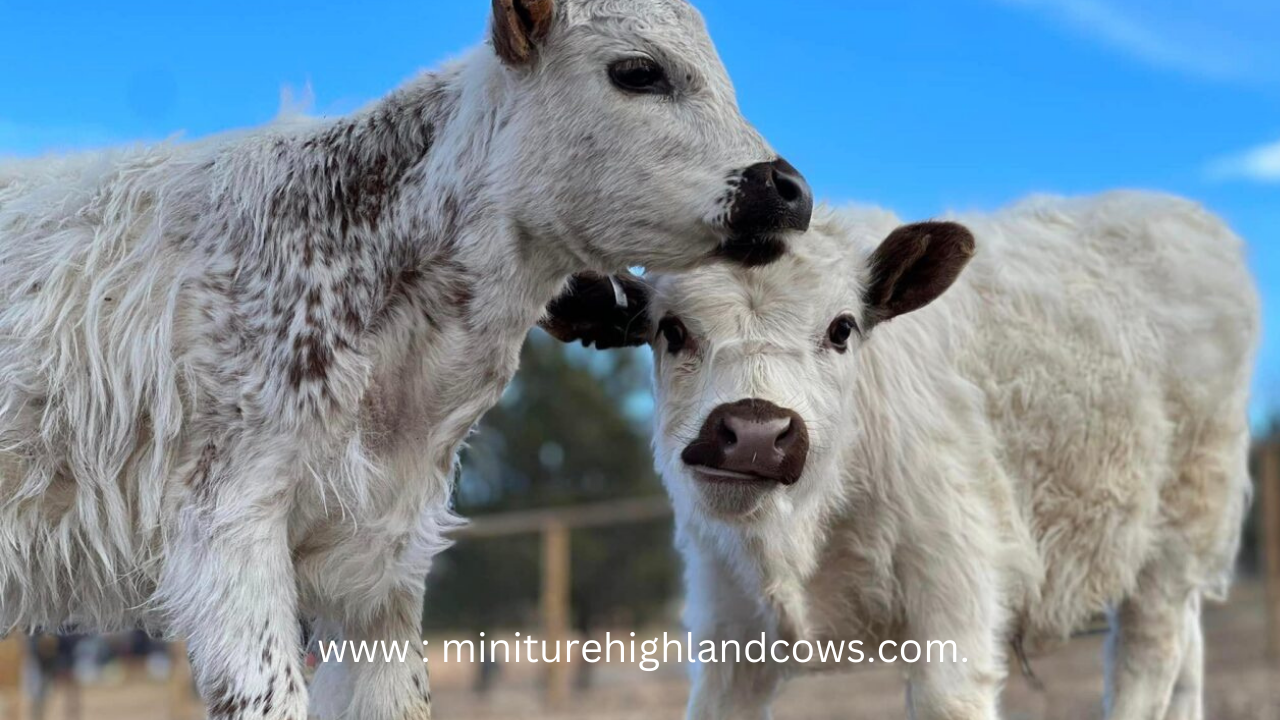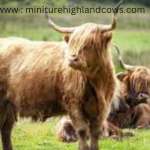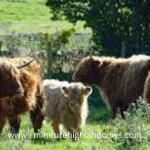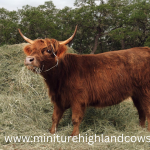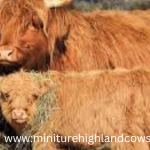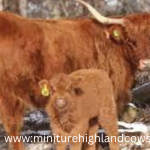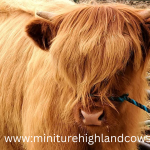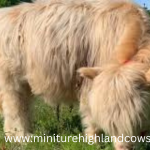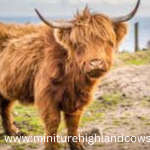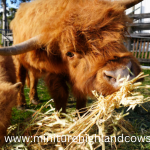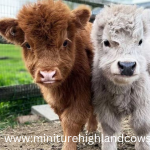Miniature Highland cows are miniature versions of the Highland original breed but with long horns and extremely shaggy coats. Such miniature cattle have really been popularized especially among small-scale farmers, homesteaders, and hobby farmers because of their manageable size, friendly disposition, and their utility on the farm. One characteristic that makes it even more appealing is that they weigh between 500 to 700 pounds (about 225 to 320 kilograms).
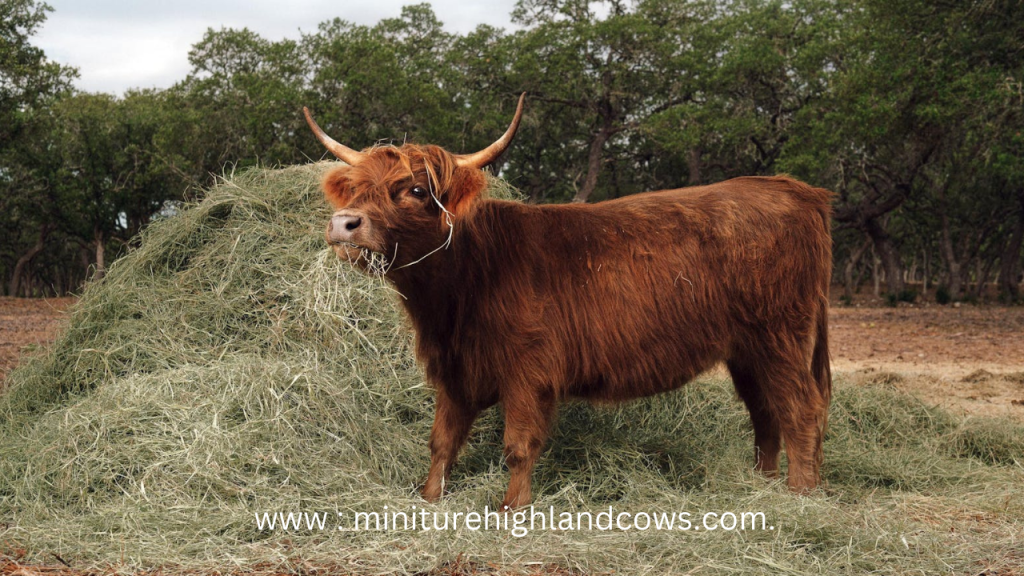
Size Comparison with Standard Highland Cattle
Standard Highland cattle are significantly larger, with mature cows weighing in between 1,100 to 1,800 pounds (approximately 500 to 800 kilograms). One of the distinctions between miniature Highland cows and standard Highland cows is a huge weight difference. The size difference is a critical factor in why miniature Highland cows are more attractive to owners of smaller plots of land or those without the funds to take care of massive animals. Mini Highland cows are smaller in size and occupy less space, consume less, and more manageable than their standard counterparts. This also confines the amount of contribution to environmental degradation since they cause minimum land damages due to their weight, making great suitability for sustainable farming practices.
What are mini Highland cows good for
Miniature Highland cows offer a plethora of practical and attractive benefits, especially for small-scale farms or homesteads. Here’s what they’re good for:
1. Beef Production
- Lean, high-quality beef: Miniature Highland cows will provide you with some of the leanest, flavorful beef, just like standard Highland cattle. Because they are smaller, you’ll get less meat, making them perfect for families or smaller-scale farming operations that wouldn’t need large quantities of beef.
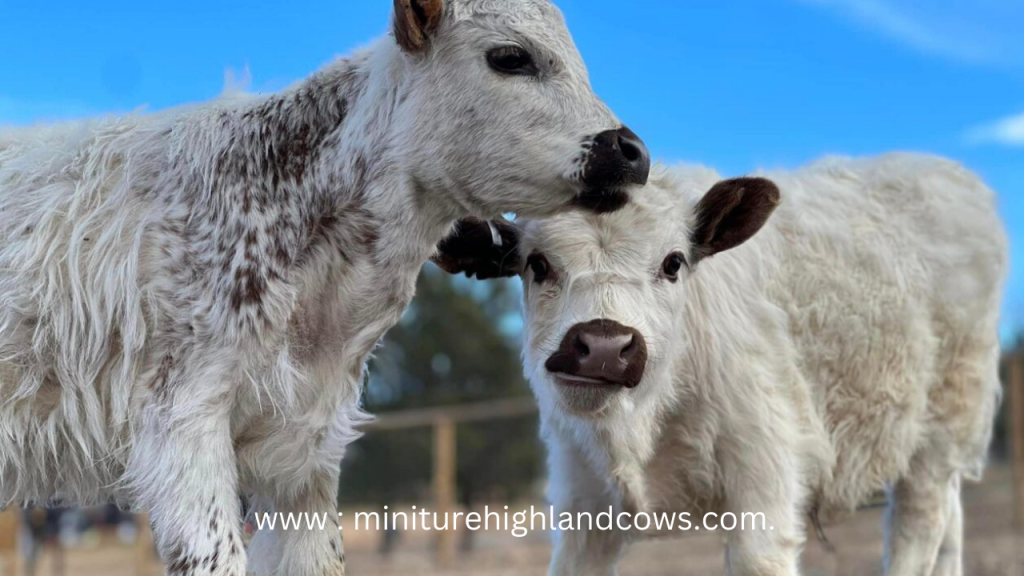
2. Low Maintenance and Efficient Grazers
Grass Fed: Mini Highland cows are rustic and tough and have a good ability for grass-based diets and, therefore, they are well suited to pasture-based farming. Also, these animals are efficient grazers that can live on lower-quality grazing land and, thereby decrease feed costs.
Low Input Farming: Compared to other standard cows, these animals are small in size, eat less and are in general easy to care for.
3. Milk Production
- Family Milk Production: Since they are not raised for commercial purposes, these livestock are applied in small-scale milk production mainly for family consumption. Highland cows’ milk is nutritious and rich, though their yield is much lower than that of dairy breeds.
4. **Land Management and Sustainability
- Natural Lawn Mowers: Mini Highland cows will graze grass, weeds, and brush, naturally keeping the landscape in check on pastures and small plots of land.
- Environmental Stewardship: Their grazing habits help promote biodiversity, and they cause less destruction to the land because they are smaller and lighter than standard cattle.
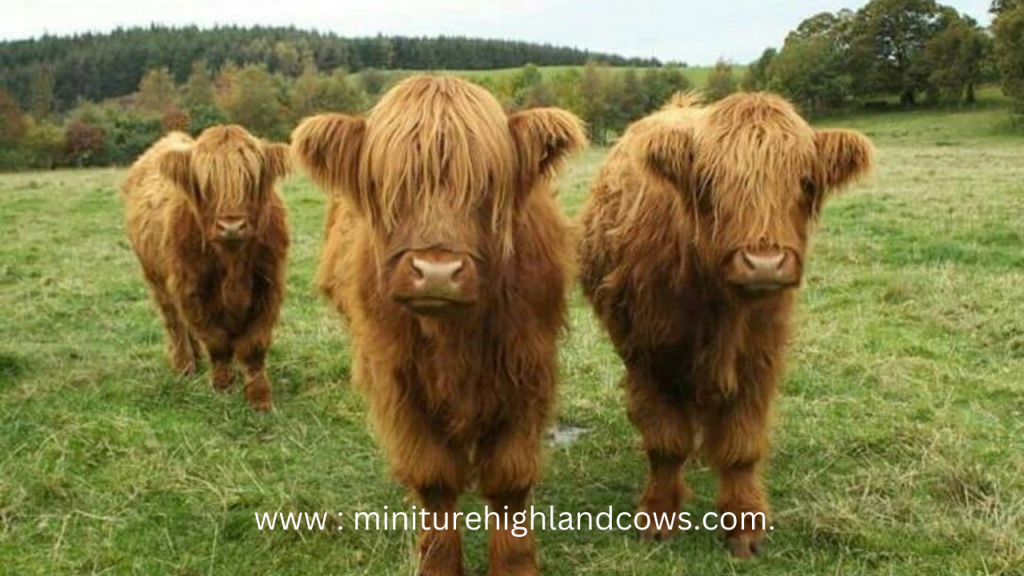
5. **Companion and Pet
- Gentle and Friendly Nature: Mini Highland cows are friendly, gentle cattle. They are mostly kept as companions or pets for persons interested in livestock but not the size and dynamics of bigger cows.
- Ideal for Hobby Farmers: So many small-scale or hobby farmers keep them due to their pleasing nature and relatively easy maintenance.
6. Beauty Factor
- Cute and Iconic: Their distinctive long horns and shaggy coats make them very visually appealing. Miniature Highland cows are often kept for their beauty and are a favorite on farms that have more to their operations focused in agritourism or farm tours.
7. Breeding Stock
- Breed and Sell: Due to their higher demand being miniature versions of the large Highland cattle, it can be bred and sold for a much higher price since more and more people look for miniature livestock for small-scale farming.
8. **Wool Production
- Fur Utilization: While not often collected, this long, thick fur could be used in some form of local handicraft or spun into fiber for personal use.
The mini Highland cows suit anyone who wants a smaller, versatile, and cute addition to their farm or homestead.
Feeding and Maintenance
The small size means that mini Highland cows will require less food and resources to maintain compared to regular cattle. A small Highland cow feeds on grass, hay, and supplementary feed as a supplement in case, according to the season, there may be less quality forage to be ingested. Also, because of their high grazing efficiency, they can be kept on poorer quality land than larger breeds may tolerate. Their weight does not help either with feed costs since they eat much less per day than other breeds, thus making them cheaper to feed.
They have a thick coat to keep them warm; therefore, the barns and big shelter may not be so necessary in most climates. If it is because of their dense fur, they are very resistant and hardy to low temperature, thus reducing health problems for such extreme weather.
Practical Uses
Mini Highland cows may be smaller but are quite capable of producing quality beef as well. Highland beef is renowned for being lean and flavorful, but the mini Highlands produce a smaller but still sufficient meat package that can be used for personal supply or small-scale farming operations. Their weight also makes them more convenient to handle for butchering and meat processing since the quantity of meat collected from a smaller animal is often easier to manage for most families or small-sized operations.
Some farmers also keep miniature Highland cows for milk production. Their milk yield, however is a far cry lower than those of dairy breeds. However it’s rich and creamy, which means that the owners can just consume them in minuscule quantities. Their lighter weight minimizes the demands in terms of care and space. This makes them the best for small homesteads that may not aim at dairy operations on a grand scale.
Land and Environmental Impact
Mini Highland cows are very beneficial for pasture management. Since they weigh less, they do not exert much pressure on the ground, which in turn decreases erosion and compaction of soils that may be associated with larger cattle. Ideal for small farms where integrity of the land needs to be maintained. Because they are more moderate in their consumption, grazing grasses and brush can save the pastures from overgrazing.
Behavior and Companion Animals
Their smaller size also makes them popular as companions or pets. At a weight of between 500 and 700 pounds, they are much less intimidating and much easier to handle than full-sized cattle. Many individuals keep them simply because of their friendly nature, along with their distinct characteristics: shaggy coats and long horns make them quite the striking appearance. They are also docile; therefore ideal for a family or for someone that wants something more interactive and friendly farm animal.
Mini Highland cow for sale
If you want to buy a Miniature Highland cow, here are some steps and resources that will be ideal for you in searching for one:
Where to Find Mini Highland Cows for Sale
- Breeders:
- The best source to get a Mini Highland cow should be from a respectable breeder. You can usually locate online or through farming communities. Verify their reputation, as a good breeder will always give healthy animals and clear information about caring and history.
- Farm Listings:
- Websites such as Craigslist and Farm Classifieds may occasionally have mini Highland cows listed.
- Livestock auction websites, including LivestockMarket.com or Cattle Exchange, sometimes list Mini Highland cows.
- Online Platforms:
- Facebook Groups: Look for local or national groups for miniature Highland cows or any type of cattle. Most of the time you’ll find people selling calves or cows directly.
- Miniature Cattle Breeders: Websites like Miniature Cattle Breeds or Highland Cattle USA normally have breeder directories with cows available.
4. Agricultural Shows or Fairs:
– Go to agricultural shows and fairs where Highland cows will be presented. These are the best events for getting to know the breeders and buying animals from them. It is possible to see the animals up close and talk to the owners themselves.
Things to Watch Out for When Buying a Mini Highland Cow
- Health: Ensure that the cow is healthy, up-to-date on all the vaccinations, and free from common health problems. Always ask for veterinary records.
Temperament: Although mini Highland cows are known to be docile, still to be discussed with regard to their behavior. You will need this if you’re raising them as pets or for use on the farm. - Price: There’s a significant difference in the price for mini Highland cows, mainly based on age and pedigree and also with breeders; basically, you can expect to pay $1,000 to $4,000 or more. The price of calves will be generally lower than that of mature cows.
- Transport: You will have to determine how you are going to transport the cow safely from the seller to your farm, and some states have certain regulations about transporting livestock.
- Environment: Ensure to have sufficient space and proper fencing for the cow. Mini Highland cows do still need pasture and a good shelter to be in good health.
Questions to Ask the Seller
What is the age of the cow? What is the gender of the cow? What is the diet of the cow? What is the routine taken for the care of the cow? Whether the cow has been handled regularly? (It impacts their temperament) Does the cow suffer from any kind of health issues or have a history of any illnesses?
- Is the cow registered with any miniature cattle associations?
However, if you seriously intend to get a Mini Highland cow, networking and talking to local farmers and cattle breeders can be really helpful. Do you want some assistance in finding specific breeders or listings in your area?
Conclusion
With a weight of 500 to 700 pounds, the miniature Highland cows are ideal for small-scale farming, hobby farming, and homesteads. Compared with others, their reduced size may make them cheaper to maintain, more environment-friendly, and easier to handle, while offering practical benefits like meat production, land management, and companionship. Due to these unique looks and manageable weight, miniature Highland cows are in great demand among people looking for low-maintenance but still functional livestock.
